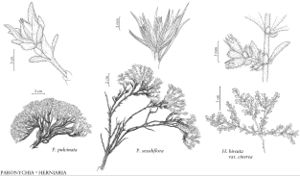Herniaria
Sp. Pl. 1: 218. 1753.
Gen. Pl. ed. 5, 103. 1754.
| Taxon | Illustrator ⠉ | |
|---|---|---|
 | Paronychia pulvinata Paronychia sessiliflora Herniaria hirsuta var. cinerea | Barbara Alongi Barbara Alongi Barbara Alongi |
Herbs, annual, biennial, or perennial. Taproots slender. Stems ascending or spreading to often prostrate, much-branched from base, mat-forming, terete. Leaves opposite, or distalmost alternate (from reduction of 1 member of a pair), connate by a line of tissue between adjacent stipules, sessile or virtually so; stipules 2 per node, inconspicuous, white, ovate to deltate, margins ciliate, apex acute; blade 1-veined, oblanceolate to elliptic or suborbiculate, not succulent, apex acute to rounded. Inflorescences densely clustered cymes usually on short lateral branches opposite a leaf; bracts paired, resembling stipules, smaller. Pedicels: flowers sessile. Flowers: hypanthium cupshaped, not abruptly expanded distally; sepals 5, distinct, greenish to whitish green, lanceolate to oblong, 0.5–1.5 mm, herbaceous, margins green, herbaceous, apex acute to subobtuse, not hooded, not awned; nectaries near inner surface of filament bases; stamens (2–) 4–5; filaments distinct; staminodes 5, arising from hypanthium rim, subulate-filiform, inconspicuous; styles 2, connate in proximal 1/3, filiform, 0.1–0.4 mm, glabrous proximally; stigmas 2, linear along adaxial surfaces of style-branches, papillate (100×). Utricles at least partly enclosed by hypanthium, opening irregularly. Seeds dark-brown or black, ovoid to lenticular, slightly laterally compressed, shiny, smooth, marginal wing absent, appendage absent; embryo peripheral, curved. x = 9.
Distribution
Introduced; South America (Andes), Europe, c, w Asia, Africa, elsewhere
Discussion
Species ca. 45 (2 in the flora).
Selected References
Lower Taxa
Key
| 1 | Flowers glabrous or minutely ciliate; leaf blades glabrous or sometimes minutely ciliate; plants green, glabrous or pubescent | Herniaria glabra |
| 1 | Flowers densely pubescent; leaf blades hirsute or ciliate; plants gray-green, densely pubescent | Herniaria hirsuta |